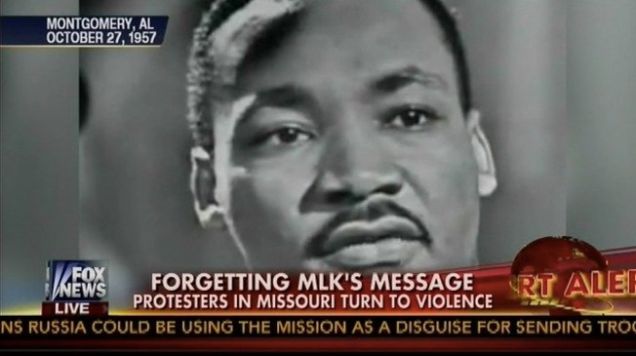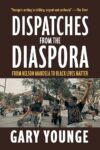In Ferguson, a city grown suddenly thick with narrative and counter-narrative, verb tense has moved away from the purview of chronology to become something more akin to lost truth; a requiem, a covering up, a political choice. In Ferguson, verb tense — what is and what was, who lives and who has been killed, what is whole and what will burn — has bifurcated a story and its aftermath, allowing broad swathes of Americans to slip easily into a moralizing future, while a people hang furious and trembling in the intransigence of the haunted historical present. It’s a failed temporal dialectic as much as it is a cultural dialogue, and while black bodies fall bleeding, passing to the realms of memory (he was/they were), America has mastered a stubbornly effective discursive trick: deploying strategic tenses to make time appear complicit in our national shame. With self-righteous futurity — or a stunted version of the present tense at hand — they pontificate broadly on what they (willfully or otherwise) misunderstand. Indeed, if they deign to revert to the past at all, it is only in modal forms: what the young black men could have done, or even worse, what they should have done.
There is a boorish kind of pleasure to the classic story arc, a rough summation of feeling and intent wherein the messiness of life’s ambiguity is abandoned for the cruder pleasures of climax and denouement. It is the pleasure of tenses, of easy judgment culled from an isolated interval, of illusory resolution. America knows these pleasures well, being a people who love their ducks in a row. Much of the national conversation spurred on by the events in Ferguson has relied on just such a narrative mechanism to limit perspective and moralize broadly like a peanut gallery cheering the mustache-twirling villain’s comeuppance. The thug struggled with righteous authority. The thug is shot. The other thugs shouldn’t be angry. This is why thugs will never get ahead. Most tenses accounted for, following the traditional arc like yapping dogs. This sequentiality isn’t a disinterested phenomenon. The function of storifying — of selectively placing events within the neatly calculated finality of tense — is to kill Michael Brown in another way entirely: by framing his tragedy as an isolated occurrence (basically, a picture book) rather than as part of a historical pattern. It is a conversation comprised of power and violence that confuses a verdict with a resolution. It is to fail to see that in Ferguson, semantic values have become personal and political values too.
William H. Gass has said that one of the perils of writing about any event is that “it will be gone before its verb is well in place and its nouns have had a chance to settle down around it.” Though he was talking about the writing of fiction, the same peril exists in journalism and the vagaries of public discourse. What is lost in any account of the past? That depends, as always, on where the events stand in relation to the hegemonic interest. Pieces of time are discovered, lost, gained, revised, as if by a conjuror’s trick. Descriptions emerge to frame the narrative, shoehorning a historically precipitated crisis into a kind of cheap morality play. Black bodies moving through fire. Shattered glass and vague shouting. “These animals are looting” (stunted present tense); “African Americans were rendered invisible and disposable within the white metanarrative, and left without recourse” (ignored past tense). “These losers are ruining their community” (stunted present indicative tense); “The people of Ferguson were robbed of community by racial profiling and murder” (ignored past tense). Selecting tenses, selecting versions of an acceptable reality, mainstream white America had seized upon their tale, aptly summed up by Tea Party dullard and ex-Hercules Kevin Sorbo:
Ferguson riots have very little to do with the shooting of the young man. It is an excuse to be the losers these animals truly are. It is a tipping point to frustration built up over years of not trying, but blaming everyone else, The Man, for their failures. It’s always someone else’s fault when you give up.
With a breathtaking lack of perspective and (even for a rich white dude) an egregiously myopic sense of entitlement, Sorbo’s rendition (you no doubt saw or heard similar variants over the holiday weekend) serves to prop up and embolden the status quo, a present indicative vision wherein whites are prospering and black communities are either too lazy to seize the American dream (with what resources they should do so is never made clear) or too uppity to suffer in silence. Both the nouns (“excuse”, “frustration”, “losers”, “animals”) and the verbs (“not trying”, “blaming”) construct a mythical vision of white self-reliance and beastial black lethargy, as if this nation’s prosperity (not to mention white hegemony itself) wasn’t built on the backs of all those lazy, blaming, no-good minorities, their blood and loss and labor exploited over time. Pick a tense, any tense, and you’ve arrived at a difficult truth. The status quo is insidious because of its ability to effortlessly co-opt those tenses: a set of constructs born and shaped in the past, hardened in the present, and extended into the future by way of a tacit and self-serving agreement. In this way, power is manifested as a kind of continuum: the was is also the is and the will be. A narrative is exploited along with a people.
Ferguson has also introduced (or perhaps reestablished) the draconian verbal phenomenon we might call the “police tense.” It isn’t wholly original, rather, it commands and imposes across all tenses at will, creating a sense of lethal verbal agility (which is not to be confused with eloquence). For instance, take this example. “Get the fuck out of here. You get that light off, or you’re getting shot with this.” These two sentences form a perfect example of “police tense,” a brook-no-argument imperative: a command in the present, a promise of violence in the future. It is perfectly balanced, in its way, and easy to understand, if not countenance: do this, or else this will happen. Similarly, consider this case. “You’re getting maced next time you pass us.” What we have here is a purely futural threat that is also functionally promissory and luridly animated by desire and power. There is an urge there, a provocation lurking like a snake in tall grass. “Police tense” often works in such a way. It contains the seeds of enforcement, conservation, sadism, frustration, mockery — whatever the situation calls for — and remains temporally fluid much like the status quo discussed above. It is a linguistic system worthy of deeper study; for our purposes here, an understanding of its implied relation to power-over-time (that is, yesterday, today, and tomorrow) will suffice.
The tenses of Darren Wilson, too, deserve further scrutiny. In his testimony, Wilson described Michael Brown in terms of a fantastical creature: “it looks like a demon.” Enter the supernatural present tense. Wilson’s statement, while similar in transformative power to the ever popular “look at these animals,” is also richer, darker, more sinister. Brown is (was) not only a “demon,” but an “it.” Later in the same testimony, Wilson said that Brown “looked like he was bulking up to run through the shots, like it was making him mad that I’m shooting at him.” One pictures a Marvel supervillain, larger than life, a being of superhuman strength that is able to withstand bullets. Could the conception that an 18 year old kid looked like the spawn of Satan crossed with something out of a comic book help to influence Wilson’s decision to use lethal force (at a distance)? How could it not? The supernatural tenses help to maintain expectations and assumptions with regard to black humanity. Depersonalization buoys a cultural logic wherein a black person getting shot every 28 hours is construed not as tragedy but as keeping a terrifying Other in “its” place.
We must acknowledge, finally, that just as language is a container of consciousness, so too is it a historically oppressive tool, a means of shaping perception, of disarming the radical connotations of events in order to move them back under the grease-smeared lens of oppressive ideology, policy, and practice. Verb tense is part of this apparatus, cultivating a specific narrative that stretches back to the foundations of American culture while also being employed as a means of solidifying the power politics of a shared future. Mainstream America wants to think about Michael Brown as an isolated case. But we are historical beings, with a subtle understanding of time and consequence. We reject the coarse hypocrisies of storification. Our tenses must not serve as tools of evasion; rather, they should help us articulate the tragedy of iteration, of numb repetition, of long and bloody memory. Black men were shot. Black men are shot. Black men will be shot.
And Ferguson will not forget.
This post may contain affiliate links.








